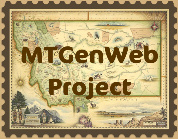BIOGRAPHIES
R. B. DUNHAM
R. B. DUNHAM, merchant, a citizen of Big Timber, and one of its most enterprising men, is a native of Missouri, where he was born October 18, 1838. His parents were Joseph P. and Margaret S. Dunham, both native Americans. His father was a farmer and for a time served as justice of the peace. In August, 1854, with his father and mother, Mr. Dunham emigrated to Kansas, here he lived for 12 years. In the spring of 1866 he returned to Missouri, but after one year relocated in Kansas, and in 1868 came to Laramie plains, Wyoming, where the Union Pacific Railroad was then being constructed. Leaving Wyoming after a stay of one year and a half, he went to Omaha, Neb., living at Council Bluffs for one year. From Nebraska he returned to Kansas (Montgomery Co., near Coffeyville), and after one year's residence went to Arkansas. In six months he left that state and returned to Jasper Co., Mo., going thence in the spring of 1874 to Colorado by way of the Platte river, to Beaver creek. From Colorado he went to the Black Hills in 1876, and was in that vicinity for eighteen months. In July, 1877, he came to Montana on a prospecting expedition, settling on his present ranch on Big Timber in the fall of that year. His ranch consists of 240 acres, mostly under fence, and is finely situated, with abundance of good water, etc. Also has a store on the opposite side of Yellowstone at Big Timber station, and since coming to this vicinity has been successful and prosperous. Mr. Dunham was married to Mrs. Westfall, a native of Missouri, September 24, 1869, and they have one child, Wyoming. Mr. Dunham is post master at Big Timber station. While on a prospecting expedition in Wyoming Mr. Dunham and two others were camped on a tributary of Wind river, beside a small stream in the valley. The next morning while eating breakfast they were fired on from the bluffs. Mr. Dunham was sitting with his back to them and a ball passed through the crown of his hat, while Mr. Steward, who was sitting opposite and in range, was struck on the shoulder and his clothes were cut through with a bullet. Gathering up their guns they ran into a small grove of timber near by containing about half an acre, which was full of fallen timbers and boulders. They were again fired on, but the shots had no effect as they were concealed behind the boulders. As yet they had not seen an Indian, but they soon began to show themselves, and were fired at whenever they were visible. The sun was very hot, and by noon the three men were very thirsty; being near a stream, they ran and threw themselves into the water for a drink and returned to their place of concealment. Two volleys were fired at them but no one was hit. They ate up what gruel they had, but did not dare kindle a fire, as they did not believe the Indians had gone. They lay there all night, and the next morning at sunrise were again fired upon, the rifle practice being continued until 8 or 9 o'clock, before any return shots were fired. They began to feel desperate from hunger and thirst, while the Indians grew more daring, and were frequently seen passing back and forth. While lying beside a log Mr. Dunham thought an Indian was shooting at him, and shifted to a rock. The Indian raised his head, and as he did so Mr. D. shot him in the head and killed him. Soon after Mr. Steward, who was a very fine shot, killed another as he was passing from one boulder to another, the Indian falling forward on his face. The Indians left soon after, and after going to the bluffs and finding them gone, the party left and went to South Pass. Mr. Dunham built the first house in the town of Cooke, Black Hills, and while there was frequently annoyed by the Indians.
Source: Transcription from the book, History of Montana, 1739-1885, published in 1885, pages 1117-1118, located on the website, Hathitrust Digital Library (http://www.hathitrust.org), accessed 22 February 2023.

